|
|
|
Sort Order |
|
|
|
Items / Page
|
|
|
|
|
|
|
| Srl | Item |
| 1 |
ID:
184125


|
|
|
|
|
| Summary/Abstract |
Sri Lanka’s ethnic civil war between the Liberation Tigers of Tamil Eelam (LTTE), also known as the Tamil Tigers, and the government of Sri Lanka comprising the majority of the Sinhalese Buddhist community came to a bloody end in May 2009. Muslims, whose political and civil society elite had largely supported the Sri Lankan state and security forces, welcomed the end of the war and the defeat of the Tamil Tigers given the history of the community with the LTTE. The expectations by the Muslims (and other communities) that peace would return to the country, were quickly dashed as it appeared that a new extremist Sinhala-Buddhist nationalist movement targeting religious minorities especially the Muslims would emerge as the country grappled with post-war reconciliation. The rise of anti-Muslim rhetoric, hate speech, and incitement to violence against the community has pushed some Muslims to think that they have become the new focus for Sinhala-Buddhist extremists in the wake of the defeat of the Tamil Tigers. With suspicions of the complicity of the state apparatus in the anti-Muslim campaign, there are serious concerns around the role and place of minorities (non-Sinhala and non-Buddhist) in the future makeup of the country. While there is no concrete evidence on the state’s support for such an action, it is clear that the reluctance of the state to bring to justice those responsible for hate speech and incitement to violence since 2009 raises some serious questions about impartiality. In addition, with the increase of detentions and scrutiny of the Muslim community’s post-Easter Sunday attacks and the recent treatment of the Muslim community in the response to the ongoing global COVID-19 pandemic, including shutting down of key Muslim towns and the enforcement of forced cremations (which goes against Islamic teachings of dignified burials), there is much to ponder of an anti-Muslim strategy being mainstreamed and institutionalized by the state. This paper will seek to situate the present response to the COVID-19 pandemic by the state and its particular actions affecting the Muslim community amid a wider backdrop of a rise in anti-Muslim hatred and action. In order to understand this, the paper will seek to understand the reasoning behind why Muslims who supported the war against the Tamil Tigers, have now become the enemy for Sinhala-Buddhist extremists. It does this through primary and secondary data gathering including interviews conducted between July 2020 and February 2021. In so doing this paper will explore the development of Muslim political and religious identity by looking at a historical perspective. This paper makes the argument that a holistic approach needs to be developed to avoid a new conflict taking place in Sri Lanka and to avoid violent Islamist extremism taking hold.
|
|
|
|
|
|
|
|
|
|
|
|
|
|
|
|
| 2 |
ID:
172858
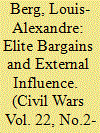

|
|
|
|
|
| Summary/Abstract |
This article explores how elite bargains affect external influence over civil-military relations. It argues that opportunities for security assistance arise from fragmented post-war coalitions and negotiations among rival factions. In post-civil war Liberia and Sierra Leone, the role of security assistance reflected bargains struck by ruling elites to consolidate their authority. Politicians used external backing to maintain fragmented coalitions while neutralising threats from factionalised armed forces. Reliance on security assistance enabled external influence through conditioning aid, delegated control, and day-to-day interaction. These cases highlight the importance of examining internal politics to explain the effects of security assistance.
|
|
|
|
|
|
|
|
|
|
|
|
|
|
|
|
| 3 |
ID:
179528


|
|
|
|
|
| Summary/Abstract |
Characteristics from the social construction of ‘self’ and of ‘others’ in Bosnia-Herzegovina show that the creation of a positive self-image in this post-war society is strongly connected with collective self-victimisation of one’s own in-group. An objective hermeneutical analysis of narrative interviews conducted with Bosniaks, Bosnian Croats, and Bosnian Serbs reveals five self-victimisation strategies: Two dissociative strategies, which conspicuously reproduce the dichotomy of victim and perpetrator along ethnic lines and candidly reinforce the ethnic boundaries – moral alchemy and double relativisation – and three strategies, which seem to transcend the boundaries between ethnic in-group and out-group – the associative strategies of subjectification of war, the externalisation of responsibility, and silence. A subsequent contextualisation of the identified strategies indicates, however, that, ultimately, associative strategies are equally conducive to the further manifestation of ethnic boundaries.
|
|
|
|
|
|
|
|
|
|
|
|
|
|
|
|
| 4 |
ID:
146129
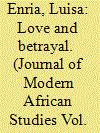

|
|
|
|
|
| Summary/Abstract |
Youth unemployment is often presented as a security risk in post-conflict countries, yet the relationship between labour market exclusion and engagement in violence remains little understood. This paper opens up one aspect of this relationship, analysing how the employment aspirations of Sierra Leone's marginal youth relate to their decisions to take part in political unrest. Telling the stories of urban youth involved to varying degrees in violent episodes shows how violence is used as a tactic to signal loyalty to political strongmen. Such loyalty is hoped to result in the establishment of relations of reciprocity that will offer a road to socially valued employment. Comparing the experiences of two groups of young people, similar in their socio-economic background and experience of violence but different in their collocation in political networks, reveals two things. Firstly, availability for violence was insufficient to achieve durable incorporation, as pre-existing social ties determined the nature of recruitment. Secondly, as even those embedded in politicians’ networks of reciprocity appeared ultimately unable to escape marginality, their experiences cast doubt on the expediency of using violence as a way into the labour market, making the exploitative nature of these relations starkly evident.
|
|
|
|
|
|
|
|
|
|
|
|
|
|
|
|
| 5 |
ID:
128885
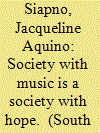

|
|
|
|
|
| Publication |
2013.
|
| Summary/Abstract |
This paper explores the concept of 'speaking beyond trauma' in societies undergoing post-war reconstruction and recovery after decades of colonization and violence. It examines inequalities in the production of knowledge and the re-colonization of knowledge economies dominated by well funded 'experts'. It draws contrasts with the precarious lives of underfunded local knowledge producers, especially musicians and artists, whose compositions transcend methodological nationalisms. The focus of this paper is on the tactile aspect of practising and playing music: perceived by, connected with, appealing to the sense of touch, producing the effect of solidity. The paper examines how music can weave, repair, connect, disconnect and reconnect people and affective communities of belonging in a society shattered by colonization, war and ongoing conflicts.
|
|
|
|
|
|
|
|
|
|
|
|
|
|
|
|
| 6 |
ID:
085920
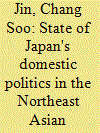

|
|
|
|
|
| Publication |
2008.
|
| Summary/Abstract |
This study considers how the post-war generation has expanded its influence in Japanese politics after the 90's.This generation has strongly desired to re-evaluate the LDP conservative main stream,Which was oriented around economic development and preferred peaceful diplomacy.
|
|
|
|
|
|
|
|
|
|
|
|
|
|
|
|
| 7 |
ID:
086194
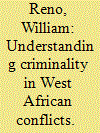

|
|
|
|
|
| Publication |
2009.
|
| Summary/Abstract |
Most standard analyses and policies aimed at peacekeeping and post-conflict reconstruction in West Africa understand members of armed groups, and especially their leaders who engaged in illicit commerce, as criminals. This analysis and the policies that follow from it miss the extent to which these transactions now contribute to the construction of new political relationships and are seen by those who participate in them as one of the few avenues for active participation in the post-war economy and politics. This article explains how illicit commerce underlies new political relationships in West Africa. It shows how measures to disrupt these transactions can destabilize politics. But often those who participate in illicit markets prove able to manipulate externally imposed measures and assert their own interests.
|
|
|
|
|
|
|
|
|
|
|
|
|
|
|
|
| 8 |
ID:
151242


|
|
|
|
|
| Summary/Abstract |
Philanthronationalism – the pursuance of corporate ‘good governance’ and equality initiatives for ethno-religious political ends – shapes at a fundamental level business practice in Sri Lanka. In this article, Sri Lankan firms’ approaches to the management of ‘diversity and inclusion’ in human resourcing, brand development, and market expansion and outsourcing are explored. While many in the private sector appear to wish to promote the creation of a more harmonious and peaceful society through ethical governance processes, a continued concern to play to the Sinhala Buddhist nationalist constituency often makes this difficult.
|
|
|
|
|
|
|
|
|
|
|
|
|
|
|
|
| 9 |
ID:
161137


|
|
|
|
|
| Summary/Abstract |
This contribution suggests how to identify and deal with ex-combatants in (un)peaceful post-war environments from a methodological perspective. While it is obvious that large-N studies or standardized interviews fall too short to depict post-war dynamics and related conflict risks, ethnographic methods face numerous challenges, too. First, the identification of and access to former combatants may prove to be difficult. Often being stigmatized or perceived as outlaws they may not wish to get in touch with ‘outsiders’, like academics. Second, researchers need to be careful not to worsen the status of ex-combatants and at the same time make sure to maintain a trustful relationship with the rest of the community. Moreover, certain ethics apply when addressing sensitive war or contemporary issues (e.g. land grabs), even more, if there is a lack of amnesty. I aim at critically discussing questions of trust, legitimacy, networks, the necessity of ‘going local’, as well as logistics that can exacerbate dealing with ex-combatants or even pose a threat to researchers. Before concluding, I briefly delineate dilemmas related to the researcher’s role and her responsibility for field assistants. The article largely draws on my extensive ethnographic fieldwork experience in Cambodia and ethnographic literature on (post-)war settings.
|
|
|
|
|
|
|
|
|
|
|
|
|
|
|
|
| 10 |
ID:
168496


|
|
|
|
|
| Summary/Abstract |
Taking wartime nurses – and post-war nursing – seriously makes one think more politically about the wounds endured in wartime and what counts as a wartime ‘wound’. Thinking about wounds and the wounded, in turn, reveals how war-waging officials, and militarizers more generally, have tried in the past, and today still try, to shrink citizens’ awareness of militarism’s negative consequences. Nursing, nurses, wounds, and the wounded each continues to be gendered, influencing the workings of both masculinities and femininities in past and current wartimes and post-war politics. Feminist analysts have expanded the ‘political’ and multiplied ‘political thinkers’. Failing to absorb these feminist theoretical insights fosters the trivialization of nurses and other caretakers of the wartime wounded and their diverse political thinking. It is a failing with serious implications. Overlooking nurses and others who provide wartime care, combined with a lack of curiosity about wounds, perpetuates militarization and war.
|
|
|
|
|
|
|
|
|
|
|
|
|
|
|
|
|
|
|
|
|